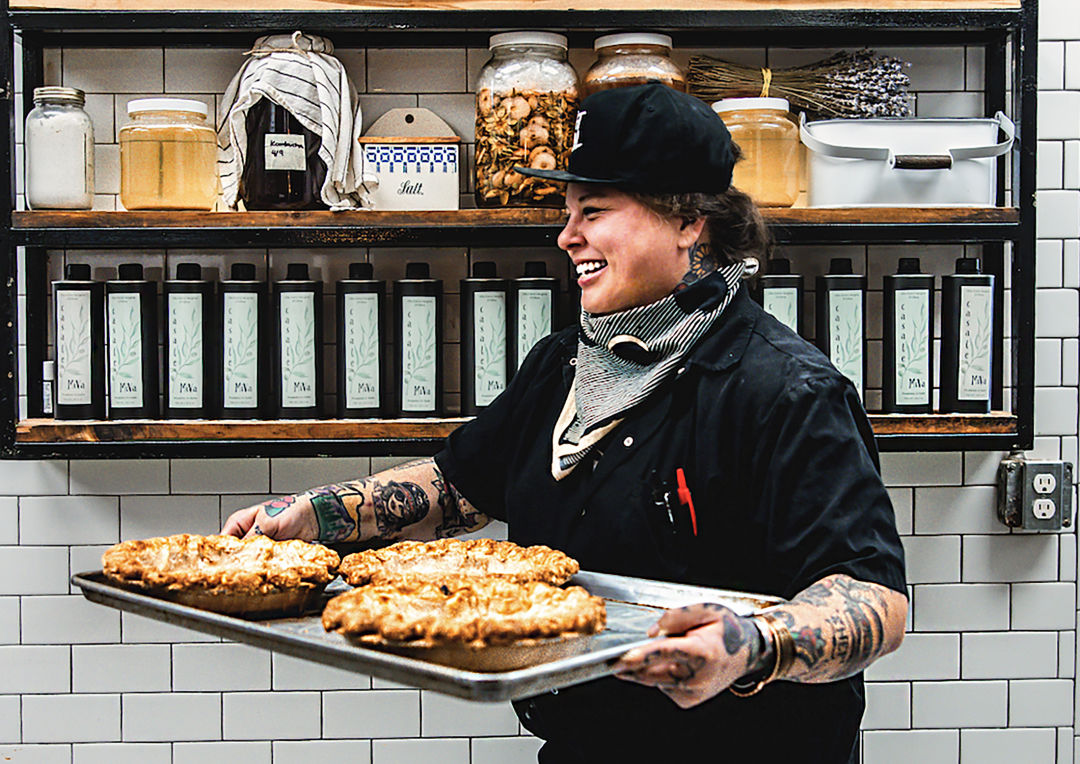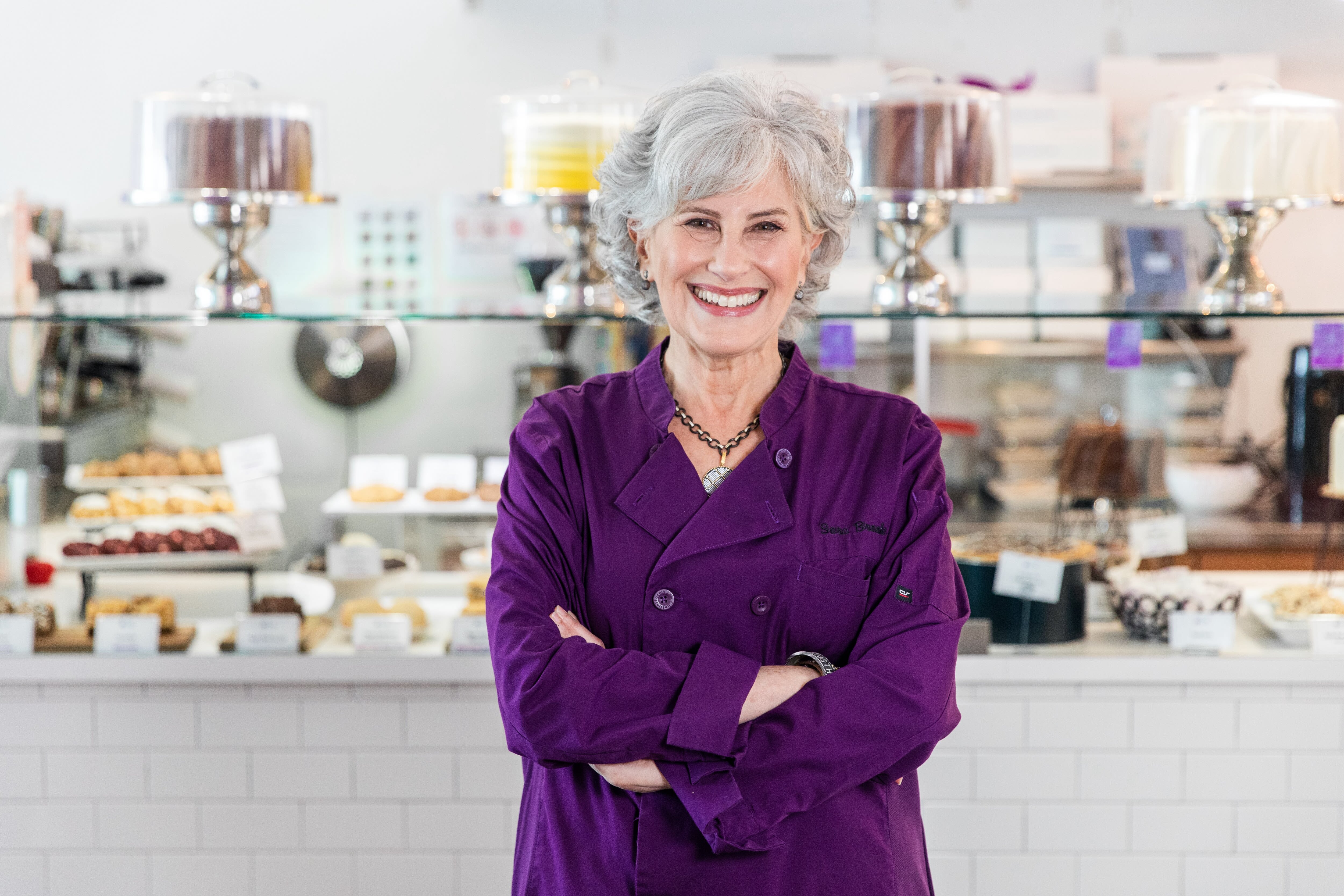Jane Wild’s Journey to Her Houston Heights Bakehouse

When Jane Wild was growing up in Coldspring in Texas’s rural Pineywoods, the nearest grocery store was 30 minutes away. Instead of processed fruits and veggies, she was used to her mother, a home economics teacher at the local school, cooking with ingredients from their neighbors’ gardens. “Cooking was definitely in our caliber,” she says. Now, Wild integrates that same thinking into Jane and the Lion Bakehouse, a new bakery that’s known for its inviting atmosphere, cozy interior, and farm-to-table food.
Throughout school, Wild participated in 4-H, the youth development program that helps students practice skills in various activities like sports, food science, healthy living, fashion, and photography. Wild chose cooking, throwing her hat in the ring in local competitions like small-town or county fairs, with kids entering a pie or cake and adults judging to see who would win a ribbon.
Wild switched gears in high school, opting for extracurriculars like theater, band, and student council. That’s when the itch for baking began to set in. Wild recalls badly wanting to go on a school trip with her classmates to Washington, DC, and Europe, but her parents told her that in order to attend, she’d have to come up with the money.
Wild was stumped. With so many extracurriculars in her schedule, she knew she couldn’t work an hourly job, and her babysitting gigs could only help raise so much. Instead, she decided to launch Sunshine Cookie Company, her very first bakery and business. “I went to Michael’s and got a rubber stamp with a sunflower on it,” Wild says of her early branding efforts. “I stamped all my bags with sunflowers.”
She sold cookies and brownies to her classmates, attendees of school board meetings, and even some workers at the local bank, but she needed more money if she was going to travel abroad. She managed to tap into her 4-H roots to raise and sell a couple of sheep, which helped her to finally meet her fundraising goal for the trip.
Wild received a scholarship to study theater in college, but after a semester at the now-closed Lon Morris College in Jacksonville, Texas, she realized that the life wasn’t for her. Back home, it was back to the drawing board. After some encouragement, she visited the Art Institute of Houston (also now closed) to check out its classes.
“I went on the fourth floor, and when the elevator opened and [I saw] all these kitchens and chefs, I was like, ‘Oh my gosh, I never thought about being a chef,’” she says. Immediately, Wild signed up for the Art Institute’s 72-month program and gave it her all. She soon fell in love with chefs like Alice Waters, Thomas Keller, and Charlie Trotter—Trotter and his eponymous Chicago restaurant even inspired Wild’s own move to the Windy City.
But Wild didn’t end up in some big-named, Michelin-starred restaurant in Chicago. Instead, she found herself working for the then-up-and-coming grocery store Whole Foods in the ’90s. She started as the night supervisor in the prepared foods section and within six months, moved up to corporate chef for the Midwest before jumping at the opportunity to help with its West Coast expansion. She packed up everything she and her son, Maxx, owned, and headed to Portland, Oregon.
At that point, it was the early 2000s, and the food scene in Portland was inspiring, Wild says. Everyone in the dining scene was doing their own thing, and she and Maxx quickly fell into a routine, going grocery shopping at the farmers market on Portland State University’s campus every Saturday. “It was a dream farmers market [filled with] wooden crates and all the colors,” Wild says. “It was a total event for us.” Reinvigorated by the city’s passion, she left her corporate life behind and entered a new era with a job in a local bakery. But it didn’t last long before Texas called her home.
It was Wild’s parents who persuaded her to move back, but this time to The Woodlands, which was a significant change from Portland for her and her son. She wanted to maintain some normalcy, so she traveled to Tomball’s farmers market with Maxx in tow to score most of her groceries. But she noticed one glaring omission at the market: There was no bakery booth.
Wild’s entrepreneurial spirit took over. “I immediately started working on how to start doing it,” says Wild, who began cooking out of her kitchen at home to create a bakery stand.
Not only had Wild’s parents lured her back to Texas, but her mom and the mother of an old high school buddy, John Blankemeyer, were busy playing matchmaker, and they set the two up on a date. Instead of romance, a business blossomed. Wild and Blankemeyer teamed up to create a brick-and-mortar in 2014. For four years, the Jane and John Dough Bakery served breakfast, lunch, and a variety of pastries, plus beverages from Portland-based Stumptown Coffee Roasters.
After that business venture came to an end, Wild ended up working in restaurants like the Dunlavy and Golden Bagels & Coffee. At the end of 2020, she decided it was time to invest in her own brand again, with an eventual hope of opening a second brick-and-mortar. With help from her family, Wild began selling goods and rotating between the Rice Village and the Heights Mercantile Farmers Markets on Sundays, and eventually Urban Harvest Farmers Market, which became her mainstay. And this past spring, she went back to where it all began, extending her presence once again with a stall in the Tomball Farmers Market on Saturdays.

By July 2024, Wild found herself prepping her market goods in kitchen of the the former doughnut and coffee shop Morningstar in the Heights (4721 N Main St), sharing the space with Greenway Coffee Roasters pastry chef Christian Au. Six months later, she took over the lease.
Fast-forward to April, and Wild opened Jane and the Lion Bakehouse, a Heights bakery she operates along with three farmers market stalls on weekends. It’s all a part of Wild’s mission to bring to Houston everything she’s learned and loved over the years, she says.
“I love taking care of people and creating a space that’s really fun,” Wild says.
When diners walk into Jane and the Lion, they are immediately greeted with Wild’s playlist, which shifts between what she describes as “rebellious loud music” and more vibe-y early-2000s songs, and a cozy environment with secondhand furniture, decor, and plates.
In addition to the reliance, carried from her upbringing, on ingredients from local farmers and gardens, Jane and the Lion’s sustainable cooking methods include a no-waste policy: Fennel, for example, is used in early spring for salads, with the leftover stems and fronds, the leafy greens, saved to make chile oil. The menu is ever-changing, but there’s generally some sort of toast, sandwich, salad, and egg tart. Wild says diners can expect seafood additions and more options for breads in the next month or so.
Wild says the bakery is now in phase one, and she hopes to ease into the next phases in a year with extended hours, curbside pickup, online ordering, local beer, wine, cocktails, and an expanded menu. Until then, Wild says the phased approach allows her to create a team that’s “rich like bone marrow.”

She plans to gauge diners’ interest in dinner with a limited farm-to-table series in the evenings after the bakery closes for the day. A ticketed five-course, family-style dinner is already in the works for September in observance of the autumnal equinox. To bring it to life, Wild has invited farmers Michael and Leslie Marchand of Whitehurst Farm in Brenham to be a part of the event, as well as a potential distillery or vineyard.
Down the line, Wild says she has even bigger dreams, like a space to host culinary classes where Houstonians can learn to butcher meat, make sourdough, and build floral arrangements. Maybe one day, she’ll have her own market. For now, though, she’s focused on creating an unforgettable atmosphere for her diners.
“I just want it to be so special,” Wild says. “I really want you to feel like you’re in my living room.”




